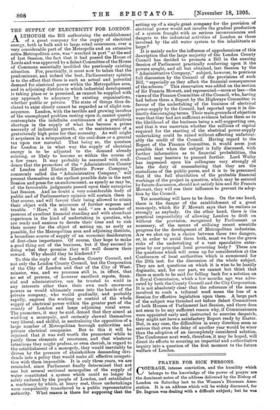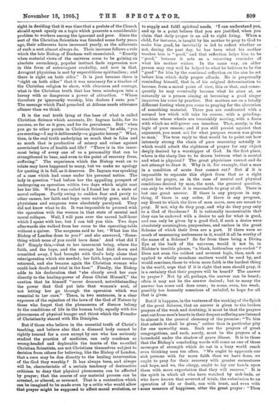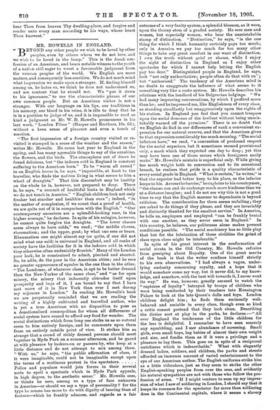right in deciding that it was time that a prelate
of the Church should speak openly on a topics which presents a considerable problem to workers among the ignorant and poor. Since the sect of the Christian Scientists was Minded some forty years ago, their adherents have increased yearly, as the adherents of such a sect almost always do. Their increase follows a rule which the late Bishop of Durham well enunciated. "Exactly when material views of the universe seem to be gaining an absolute ascendency, popular instinct finds expression now in this form of extravagant credulity, and now in that. Arrogant physicism is met by superstitious spiritualism ; and there is right on both sides." It is just because there is "right on both sides" that it was necessary for a teacher of the Christian religion to show, with clearness and courage, what is the Christian truth that has been misshapen into a, heresy with so dangerous a power of attraction. "Whom therefore ye ignorantly worship, him declare I unto you." The message which Paul preached at Athens needs utterance oftener than we think.
It is the real truth lying at the. base of what is called Christian Science which accounts, Dr. Ingram holds, for its success, so far as it goes, and for its prevalence. But "when you go to other points in Christian Science," he adds, "you are erecting—I say it deliberately—a gigantic heresy." What, then, is the real truth underlying so much that is false and so much that is productive of misery and crime against ascertained laws of health and life ? "There is in the inner- most being of every one of us a personality that can be strengthened to bear, and even to the point of recovery from, suffering." The experience which the Bishop went on to relate may have happened to many, but we make no apology for quoting it in full, as it deserves. Dr. Ingram was speaking of a case which had come under his personal notice. The lady in question "had before her the appalling prospect of undergoing an operation within two days which might cost her her life. When I was called in I found her in a state of moral collapse. Partly owing to sudden fear and partly to other causes, her faith and hope were entirely gone, and the phyeicians and surgeons were absolutely paralysed. They did not know what to do. It was impossible to proceed with the operation with the woman in that state of mental and moral collapse. Well, I will pass over the sacred half-hour which I spent with her, but I can tell you this. Two days afterwards she walked from her room to the operating-table without a quiver. The surgeons said to her, What has the Bishop of London done to you ?' and she answered, Some- thing which none of you could have done.' And what did I do? Simply this,—that to her innermost being, where the faith, and the hope, and the courage had died down and crumbled away, I had brought with God's help alone that reinvigoration which she needed; her faith, hope, and courage returned, and she became again the Christian woman who could look death and trial in the face." Finally, the Bishop adds to his declaration that "she clearly owed her cure directly to the healing-power of Jesus Christ Himself," the caution that he himself "never dreamed, notwithstanding the power that God put into that woman's soul, of not letting her go through the operation which was essential to her cure." There, in two sentences, is a clear exposure of the rejection of the laws of the God of Nature by those who forget that the phenomena of disease belong to the conditions of life in the human body, equally with the phenomena of physical hunger and thirst which the Founder of Christianity shared with His Disciples.
But if those who believe in the essential truth of Christ's teaching, and believe also that a diseased body cannot be rightly treated for a cure except by one who has seriously studied the practice of medicine, can only condemn as wrong-headed and deplorable the tenets of the so-called Christian Scientists, are not Christians themselves subject to derision from others for believing, like the Bishop of London, that a cure may be due directly to the healing intervention of the God they worship P It has always been, and always will be, characteristic of a certain tendency of destructive criticism to deny that physical phenomena can be affected by prayer; that the course of any material process can be arrested, or altered, or reversed. That is a contention which can be imagined to be made even by a critic who would allow that prayer might be supposed to affect moral evolution, or to supply and fulfil spiritual needs. can understand you, and up to a point believe that you are justified, when you claim that daily prayer is an aid to right living. When a child, for instance, is taught by his mother to pray to God to make him good, he inevitably is led to reflect whether or not, during the past day, he has been what his mother teaches him is " good," and that reflection helps him to be "good," because it acts as a recurring reminder of what his mother wishes. In the same way, an older person may very well be helped to what he believes to be the " good " for him by the continual reflection on the aim he Bet before him which daily prayer affords. He is perpetually reminding himself, that is, of his original determination to become, from a moral point of view, this or that, and conse- quently he may eventually become what be aims at, as naturally as a person aiming at becoming a good singer improves his voice by practice. But matters are on a totally different footing when you come to praying for the alteration of something material. There you are confronted with a natural law which will take its course, with a grinding- machine whose wheels are irresistibly moving, with a force with which no will-power can interfere. That, surely, is the logic of pure reason; and if you still persist against that argument, you must ask for what purpose reason was given to man.' The true reply to that would be to point out how intensely strong the chain of pure reasoning actually is which would admit the rightness of prayer for any object deeply desired by a worshipper of God. In the first place, where is the sharp line to be drawn between what is mental and what is physical ? The great physicians cannot and do not attempt to draw it. Why is it, for example, that a man in a condition of acute fear cannot eat ? But if it is impossible to separate this object from that as a right object for prayer, as in the case of mental and physical conditions desired by man, the next, the greatest question, can only be whether it is reasonable to pray at all. There is but one great answer. If there is any purpose in any- thing, if there is any order, if there is any progress, any Event to which the lives of men move, men are meant to pray. If not, why do they pray, and why do they pray only to a God of Goodness ? It is rationally inconceivable that they can be endowed with a desire to ask for what is good, and can only be given by a good God, if such a desire were absolutely meaningless, purposeless, and useless in the great Scheme of which their lives are a part. If there were so much of unmeaning uselessness in it, would it all be worthy of the name of a Scheme ? So far from there being a Divine Eye at the back of the universe, would it not be, in Richter's terrible phrase, "a blank, bottomless eye-socket " P Does not even the coldest and severest logic, then, such as applied to wholly mundane matters would be used by, and would convince, those to whom mere faith is the hardest thing in the world, urge that if it is right that men should pray, it is a certainty that their prayers will be heard ? The answer to prayer ? Not by all, perhaps, the answer can be heard ; often it may not be the answer desired; but to many the answer has come and does come; to some, even, too weak, possibly too honestly conscious of unbelief, to hope for all that is given.
But if it happens, in the vastness of the working of the Spirit of the great Scheme, that an answer is given to the broken prayers of the weak and doubting, it must be that the prayers sent out from men's hearts in their deepest suffering are listened to almost in the general clemency of the promise : "To him that asketh it shall be given," rather than in particular pity for one unworthy man. Such are the prayers of great congregations, and such, surely, must be the prayers of a household under the shadow of grave illness. It is to those that the Bishop's concluding words will come as one of those messages of strength which do not in a busy world reach even thinking men too often. "We ought to approach our sick persons with far more faith than we have done, we ought to pray for their recovery with greater earnestness and hope, and we, the clergy, ought to lay our hands upon them with more expectation that they will recover." It is the spirit in which all who have watched by sick-beds, or who have known that severest of trials, the submission to an operation of life or death, can with trust, and even with some measure of happiness, utter the great prayer : " Then•
hear Thou from heaven Thy dwelling-place, and forgive and render unto every man according to his ways, whose heart Thou knowest."




































































 Previous page
Previous page